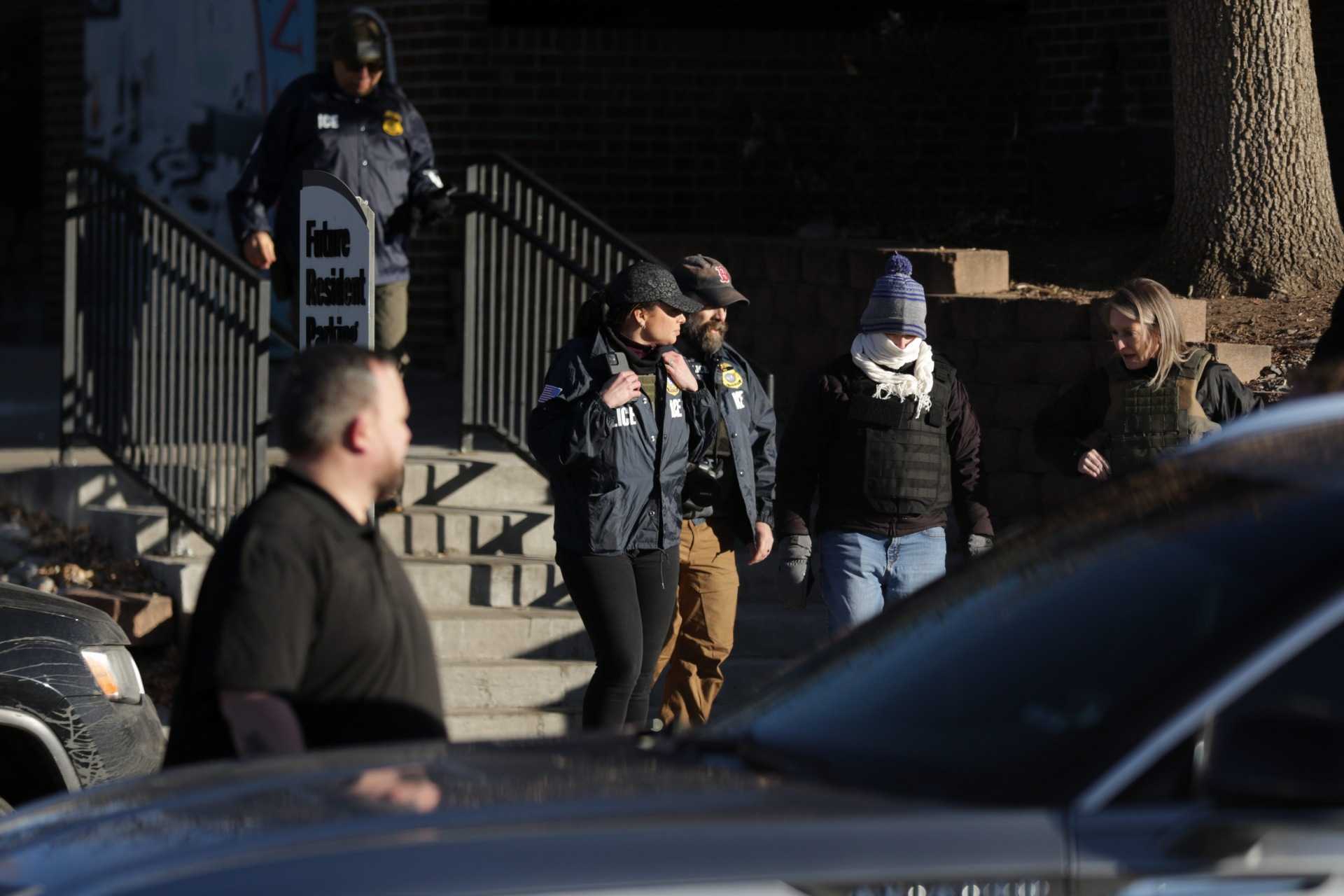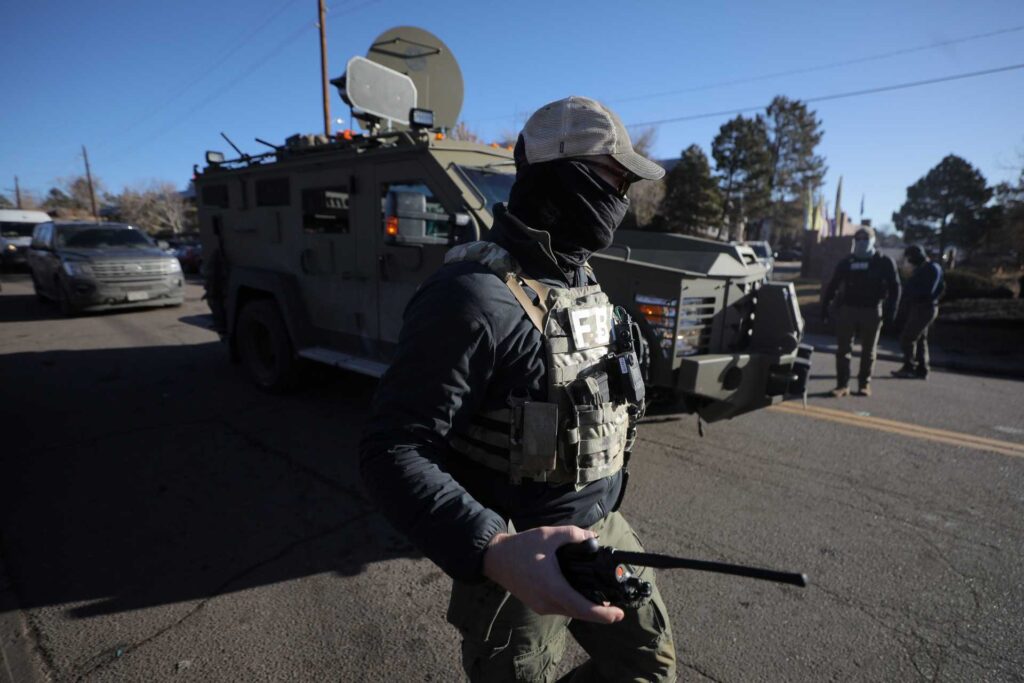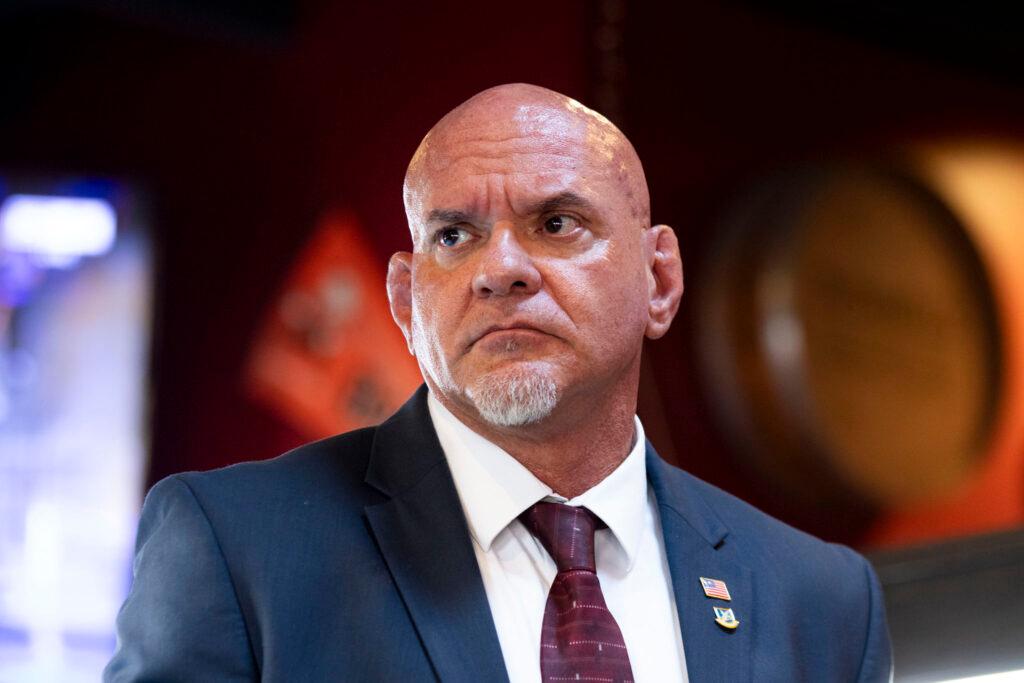
Aurora Police officers called it a “chaotic scene” — one victim jumped from a fourth-floor window to escape a fusillade of bullets, breaking both his legs; another man was found a block away with a gunshot wound in the abdomen; a third victim was found outside his apartment with a bullet wound to his arm.
Nixon Jose Azuaje-Perez, 19 at the time, methodically went through the apartment complex after the shooting to find and discard bullet casings, police said. Officers arrested him, and Adams County prosecutors charged him with tampering with evidence.
Azuaje-Perez’s family claims he is innocent, but it may not matter anyway. He will likely never see the inside of a Colorado courtroom.
“He has been deported,” said Brian Mason, district attorney for the 17th Judicial District, including Adams County. “So at the moment, we're not able to prosecute that defendant.”
Traditionally, federal, state and local law enforcement work cooperatively. Defendants are tried in the court where they are most likely to receive justice in the interest of public safety.
In recent weeks, federal Immigration and Customs Enforcement decisions have upended those longstanding relationships with local law enforcement, according to veterans of state and federal criminal justice and immigration processes. ICE agents are now grabbing criminal defendants free on bail and fast-tracking them out of the country to meet President Donald Trump’s demands for mass removals without regard to victims' rights or the judicial system.
“What worries me is the handicapping of my ability to keep my community safe,” said Mason. He added that the federal government’s actions have cascading effects. Chief among them is his concern that people will stop reporting crime.
“If victims of crimes are afraid they’re going to get picked up in the courthouse parking lot, then they’re not going to call law enforcement at all,” Mason said.
Drug dealing, domestic violence among cases on hold and perhaps headed for dismissal
CPR News has found more than half a dozen state criminal cases where defendants detained by ICE have failed to appear for their scheduled criminal court appearances:
- Luis Hernandez-Arreola, who is charged with dealing fentanyl within 1,000 feet of a school in Lakewood, failed to appear on his charges last month. He’s currently in immigration detention in Aurora. A spokesperson for Alexis King, the DA in Jefferson County, said that their prosecutor was unaware that Hernandez-Arreola was in ICE custody until CPR News reached out, but couldn’t comment more because it’s an open case.
- Rafael Cabrera-Barron was arrested for misdemeanor child abuse and drug possession in Weld County. He’s in ICE custody in Aurora and failed to appear in court on the Weld case two weeks ago. The District Attorney there, Michael J. Rourke, through a spokesperson, would not comment.
- Arnulfo Duron-Deluna failed to appear for a plea hearing on felony forgery charges in Moffat County, three weeks after he was picked up by ICE on Feb. 7. He was ordered detained while he faces federal charges of illegal reentry into the U.S. The district attorney’s office in Moffat County said that they have been in communication with ICE, but wouldn’t comment further. His Colorado court case has no hearings scheduled.
- Juan Benitez-Ortega, who also goes by the name Jorge Quinonez, was arrested by the Adams County Sheriff last December and charged with second-degree assault for strangling his girlfriend. He missed his arraignment after ICE deported him two weeks earlier on Mar. 4.
Another man, Yerbis Manuel Garcia-Quintero, failed to appear for a preliminary hearing on multiple felony charges last Thursday in Arapahoe County including kidnapping, aggravated robbery and witness intimidation. The District Attorney said he was detained by ICE and sent out-of-state, but CPR News could not locate him as a current immigration detainee, indicating he may have already been deported. ICE does not comment on individual cases.
“Based on this turn of events, it is unlikely we’ll be able to prosecute the defendant anytime soon,” Chief Deputy District Attorney Brian Sugioka said in a statement last week. “Sadly, the victims in these cases may not receive the justice they deserve.”

In the months since President Donald Trump took a hard line on immigration, ICE authorities in Colorado have boasted of numerous immigration arrests on social media and press releases, citing the criminal charges against the individuals. Left out of the press releases is that by detaining them on immigration charges, ICE is in some cases stalling serious criminal cases across Colorado, perhaps leading to eventual dismissal.
It’s unknown how many people have been picked up and detained or deported by federal agents. CPR News keeps a running tally of names using social media feeds, press releases and court filings. ICE refuses to provide a comprehensive list, and has suggested that the number of immigration arrests involving criminal defendants is larger. CPR News has also found several detainees with no criminal history.
Of the 78 people CPR News has identified, 21 have charges against them pending in Colorado courtrooms from Denver to Montrose to Arapahoe County. The charges are mostly felony cases, for things like drug dealing, domestic violence, kidnapping and sex offenses.
Occasional tension between state prosecutors and ICE has flared in the past too. But veterans of the criminal justice system say they have not seen anything quite like the current state of the relationship between ICE and the state’s DAs.
ICE position a surprise to criminal justice veterans
“I was a DA a long time ago,” said former Colorado Attorney General John Suthers. “But I will tell you, at that point in time, there was a very good line of communication between immigration and prosecutors, and you told them you needed them for a court date and they would delay the immigration proceedings.”
Suthers, a longstanding Republican who served as DA in El Paso County and Colorado Springs mayor and was appointed U.S. Attorney for Colorado under President George W. Bush, said that now some criminals may not face any consequence for their crime during what he called the “shock and awe” phase of the Trump administration’s approach to immigration enforcement. Victims won’t get their day in court. And if someone is deported before a conviction, it will actually be easier for them to reenter the U.S. at a later date.

ICE refused to grant an interview, but released a statement on X last week after the 18th Judicial District Attorney in Arapahoe County complained that Garcia-Quintero’s case was stalled because ICE didn’t get him to a hearing.
“ICE's mission is public safety, criminal aliens will not be allowed to roam free. In the past, ICE Denver and the 18th DA have enjoyed a great working relationship, with ICE honoring writs for their trials and the 18th notifying us of detainee releases,” said ICE Field Office Director Robert Guadian. “This individual was ordered removed by an immigration judge, ICE cannot keep him any longer than it takes to arrange transportation out of the country. ICE Denver hopes that the new 18th DA is willing to resolve these issues before they arise.”
Suthers said if he were a DA today he’d try to convince ICE to not deport defendants and get them to their court hearings.
“I would see if I couldn’t sit down with the federal immigration authorities in Denver, and see if we can get back to some kind of a rational basis,” said Suthers. “But [federal authorities] are under incredible pressure right now, I mean they're wrapped up in this as I say ‘shock and awe’ exercise.”
John Fabbricatore, former field office director for ICE in Colorado, said it’s incumbent on local prosecutors to get criminal defendants out of ICE’s custody and back into county jails if they want them to face prosecution. But, from ICE’s perspective under the new administration, that only works if the defendant is going to remain in jail, not be allowed to post bond.
“So under Obama and under Biden, yes ICE may have let some of those lower-level criminals bond out and then wait for them to be convicted before picking them up,” Fabbricatore said. “Trump is under the opinion that these illegal aliens could potentially commit more crimes in the community and he would rather have them deported right away.”

Most defendants in Colorado must be released on bond, but if a judge releases a defendant into the community to await trial, ICE is currently likely to pick them up and start removal proceedings to get them out of the country. That will likely mean the criminal proceedings will be put on hold or end entirely.
That might happen now in a domestic violence case in Adams County.
Lisvan Leiva-Perez was arrested last fall for cutting his girlfriend on the face with a pair of scissors during an argument.
In February, Jonathan Pullen, the special agent in charge of the Drug Enforcement Administration in Colorado, which is working closely with ICE on immigrant roundups, made an appearance on Fox and Friends. During the segment, a graphic was shown on screen listing Leiva-Perez as “detained.”
A few weeks later, Leiva-Perez failed to appear for his arraignment in Adams County. He is currently listed as in custody in immigration detention in Aurora. A new arraignment has been scheduled for later this month. It’s anyone’s guess whether ICE will get him to that hearing, or whether he will have already been deported.
Will stronger border defense protect the public better than prison terms?
The nation’s spotty history – under Democrats and Republicans – of securing the border against illegal re-entries calls into question the strategy of sending people home rather than letting criminal prosecutions and possible state prison sentences play out.
But Pullen and other Trump officials have defended the deportations before prosecution by emphasizing that the border is more secure now, so it will be hard for them to return to the U.S.
In the last few weeks in Colorado, Trump’s Justice Department has filed federal charges against at least six people for illegal reentry into the U.S. after being previously deported. In some of those cases, the federal filings show that the person reentered the country several times after previous deportations.
ICE admitted frustration with local prosecutors for not moving criminal cases forward more quickly, noting the shootout at the Aurora apartment complex took place last summer.
But the frustration cuts both ways. Arapahoe District Attorney Amy Padden, issued a statement last week after Garcia-Quintero missed his preliminary hearing on the robbery and witness intimidation charges. ICE took him into custody, and may have already deported him.
“When a federal agency’s actions prevent us from performing the job I was elected to do by transporting a defendant with pending criminal charges outside of my jurisdiction and failing to produce him for a scheduled court hearing, this is a major injustice to this community and to the victims impacted by these cases,” said Padden.

ICE’s procedures are not universal. In a handful of cases, CPR News has verified that defendants swept up on immigration violations have also made their court dates on pending criminal charges.
On March 19th, Raul Velazquez-Mendez was escorted into a Denver courtroom at the Lindsey-Flanigan Courthouse on Colfax. He had previously been detained by ICE outside the courthouse, and Denver prosecutors asked that he be brought to court. He faces sex assault charges against a minor — “aggravated incest.” Velazquez-Mendez has another court hearing scheduled for May 1.
An ICE spokesman said that it could be that those individuals who are allowed to attend their court dates may not have deportation orders yet.
One other man who does not appear to be lawfully present in the U.S. is also, at least for now, avoiding immediate deportation while his criminal case plays out.
On Feb. 28, Abraham Gonzalez, also listed in court records as Abraham Gonzalez-Romero, was accused in federal court of fighting with ICE agents who detained him on immigration violations outside a jail in Denver. One agent was knocked to the ground, and another agent deployed his Taser on Gonzalez to subdue him. The case made headlines after Denver Mayor Mike Johnston was questioned about it at Congressional hearings last month.
In that case, ICE is insisting on criminal prosecution.
| This story is part of a collection tracking the impacts of President Donald Trump’s second administration on the lives of everyday Coloradans. Since taking office, Trump has overhauled nearly every aspect of the federal government; journalists from CPR News, KRCC and Denverite are staying on top of what that means for you. Read more here. |









